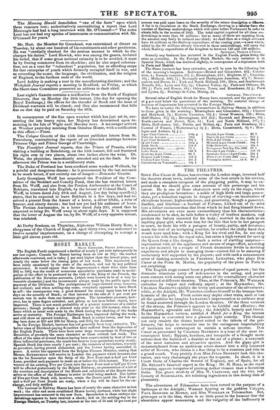THE THEATRES.
SINCE Don Ccesar de Bazan has overrun the London stage, invested half the theatres about town, iulisted some of the best actors in his service, and made a complete conquest of the playgoing public, it may be ex- pected that we should give some account of this personage and his career. He is one of those characters seen only on the stage, where they are prodigious favourites: a noble of high birth and large posses- sions, yet a houseless vagrant in danger of starving—an incarnation of chivalrous honour, highmindedness, and generosity, though a gamester, duellist, and libertine—a football of Fortune, kicked out of the mire into a loftier eminence than that from which he had flung himself down. His adventures are even more extraordinary than his characteristics :. condemned to be shot, he falls before a volley of leadless muskets, an.g pockets the bullets intended for his body ; married in the dark to-an aspiring gipsy-girl, who weds him for the title that is to be her passport to court, he finds his wife a paragon of beauty, purity, and devotion; made the tool of an intriguing courtier, he crushes the crafty hand that would have used him ; with a King for his rival and tie, he not only rescues his wife from the royal rake, but earns a high reward for saving the Queen from a like danger. Such a series of startling surprises— represented with all the appliances and means of stage-effect, according to a plot matured by a couple of French dramatists fertile in devising expedients and adepts in managing them—cannot fail to be amusing if moderately well supported by the players; and with such a consummate actor of dashing scoundrels as FREDERIC LEHAITRE, who plays Don Cmsar at the Porte St. Martin, the popularity of the piece in Paris is not surprising.
The English stage cannot boast a performer of equal powers ; but the dramatic situations carry off deficiencies in the acting, and people seem content with seeing some one phase of the contradictory character represented at different theatres. Thus, at the Princess's, Mr. Watt.tacx embodies its vulgar and ruffianly aspect ; at the Haymarket, Mr. CHARLES MATHEW s exhibits the levity and assurance of the adventurer ; while, at the Adelphi, Mr. WEBSTER confines himself to the brusque bon- hommie of the part. Fresh actors may depict other traits, until at last all the qualities we imagine LEMAITRE'S impersonation to embrace may be found scattered through the London theatres. Of the three versions of the drama, the Princess's appears to be faithful and effective ; the Haymarket's, agreeable and lively ; the Adelphi's, homely and literal. In the Haymarket version, entitled A Match for a King, the intense melodrama is converted into a pleasant light comedy. This change not only renders the drama better suited to the talents of the per- formers, but helps to reconcile one to the outrageous improbability of incidents too extravagant to sustain a serious interest. Dan Caesar as personated by CHARLES MATHEWS is a roue of the most in- consequent kind ; flippant, heedless, and incapable of a thought more serious than the fashion of a doublet or the set of a plume ; a coxcomb of the most harmless and attractive species. And the gipsy-girl is metamorphosed from an ambitious street-dancer into a silly iunocent seller of flowers, who thinks it a fine thing to be a countess and ride in a grand coach. Very prettily does Miss JULIA BENNETT look this cha- racter, and very charmingly she plays the coquette. In short, it is a Court frolic of Charles the Second of England, not of Spain, for all Mr. STUART'S funereal aspect as the King : Mr. H. Holz, as the royal favourite, appears incapable of plotting darker treason than a licentious frolic. The grave drollery of Mrs. W. CLIFFORD, and the rich buf- foonery of Saaticz.taxn, are relishing ingredients in this dainty dish of pleasantry.


























 Previous page
Previous page